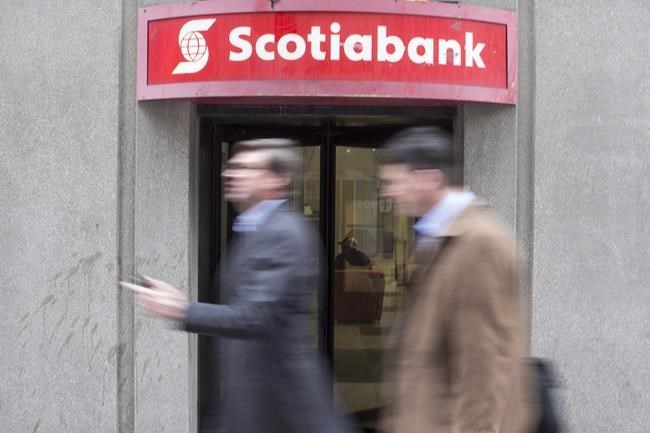TORONTO — Canadian banks are continuing to put aside hefty amounts of money to protect themselves from bad loans as the COVID-19 pandemic rages on, even as they hope the worst has passed.
The Bank of Nova Scotia revealed Tuesday that its provisions for credit losses totalled $2.18 billion in its third quarter, $1.85 billion last quarter and $713 million in the year prior.
Meanwhile, BMO Financial Group's amounted to $1.05 billion, up from $306 million last year and down from $1.11 billion last quarter.
The increase in cash reserves offer Canada's first peek at how the last few months have transformed bank budgets, which have been under pressure since the pandemic began and financial institutions started offering mortgage and other loan deferrals.
While banks have been preparing for bad loans stemming from the pandemic for a few quarters now, analysts have predicted they will now start to decrease and executives said they expect to see better numbers starting in the current quarter.
"We know that structural damage has been done to the economy. It's going to require a lot of quarters of clean up from here, but we do view this quarter's PCL as our high-water mark," Daniel Moore, Scotiabank's bank's chief risk officer, said on a conference call with financial analysts.
"We see it decline substantially from here, and we're well provisioned on the balance sheet to cover our current estimate of future net write-offs."
Despite the unclear economic outlook, BMO sounded a similarly reassuring tone. "There continues to be a high degree of uncertainty around the trajectory of the economic recovery, but we feel with this quarter's addition to our performing loan allowance, we are well prepared and provisioned," Patrick Cronin, the bank's chief risk officer, told analysts.
"We have been pleased with our credit experience so far during this crisis with credit migration, payment deferral expiry and impaired loan loss provisions well within expectations and utilization rates back to normal levels."
Scotiabank's net profit slipped to $1.30 billion or $1.04 per diluted share from $1.98 billion or $1.50 per diluted share a year ago.
The bank was "significantly" affected by operations in its Latin American markets, which were late to experience the spread of COVID-19, executives said.
On an adjusted basis, Scotiabank said it earned $1.04 per diluted share in the quarter, down from an adjusted profit of $1.88 per share in the same quarter last year. Analysts on average had expected an adjusted profit of $1.11 per share, according to financial markets data firm Refinitiv.
BMO fared better than Scotiabank, reporting a profit of $1.23 billion or $1.81 per share in the quarter. That was down from $1.56 billion or $2.34 per share a year ago.
On an adjusted basis, BMO says it earned $1.85 per share for the quarter, down from an adjusted profit of $2.38 per share in the same quarter last year.
Analysts on average had expected an adjusted profit of $1.71 per share for the quarter, according to financial markets data firm Refinitiv.
Royal Bank of Canada and National Bank of Canada are scheduled report their earnings on Wednesday, while the Canadian Imperial Bank of Commerce and TD Bank Group report results on Thursday.
This report by The Canadian Press was first published Aug. 25, 2020.
Companies in this story: (TSX:BMO, TSX:BNS, TSX:RY, TSX:NA, TSX:CM, TSX:TD)
Tara Deschamps, The Canadian Press



